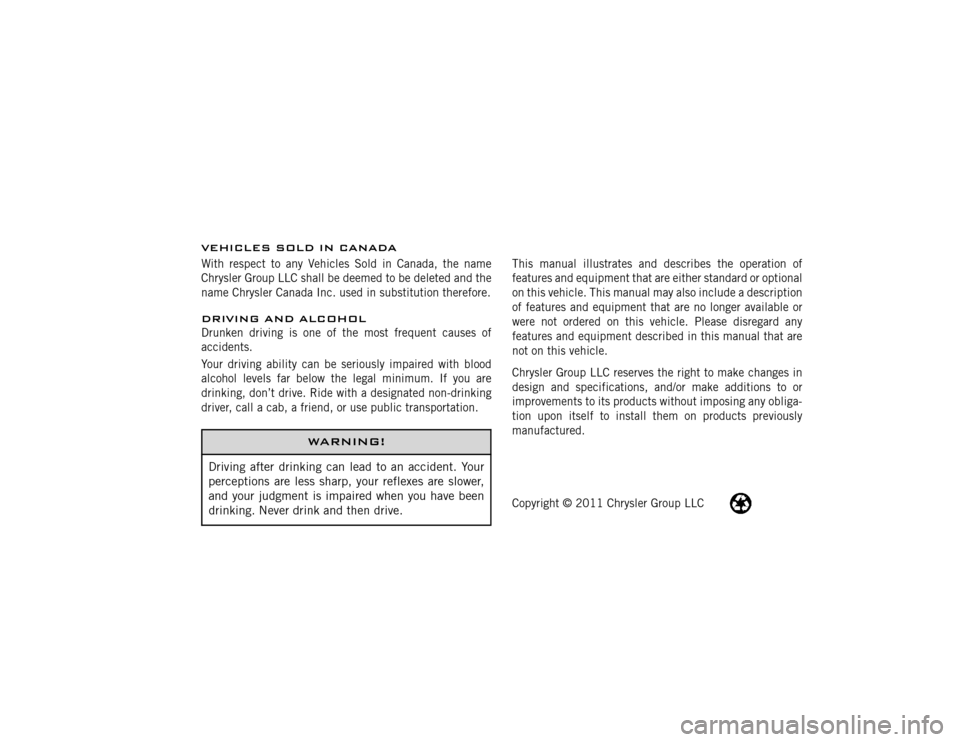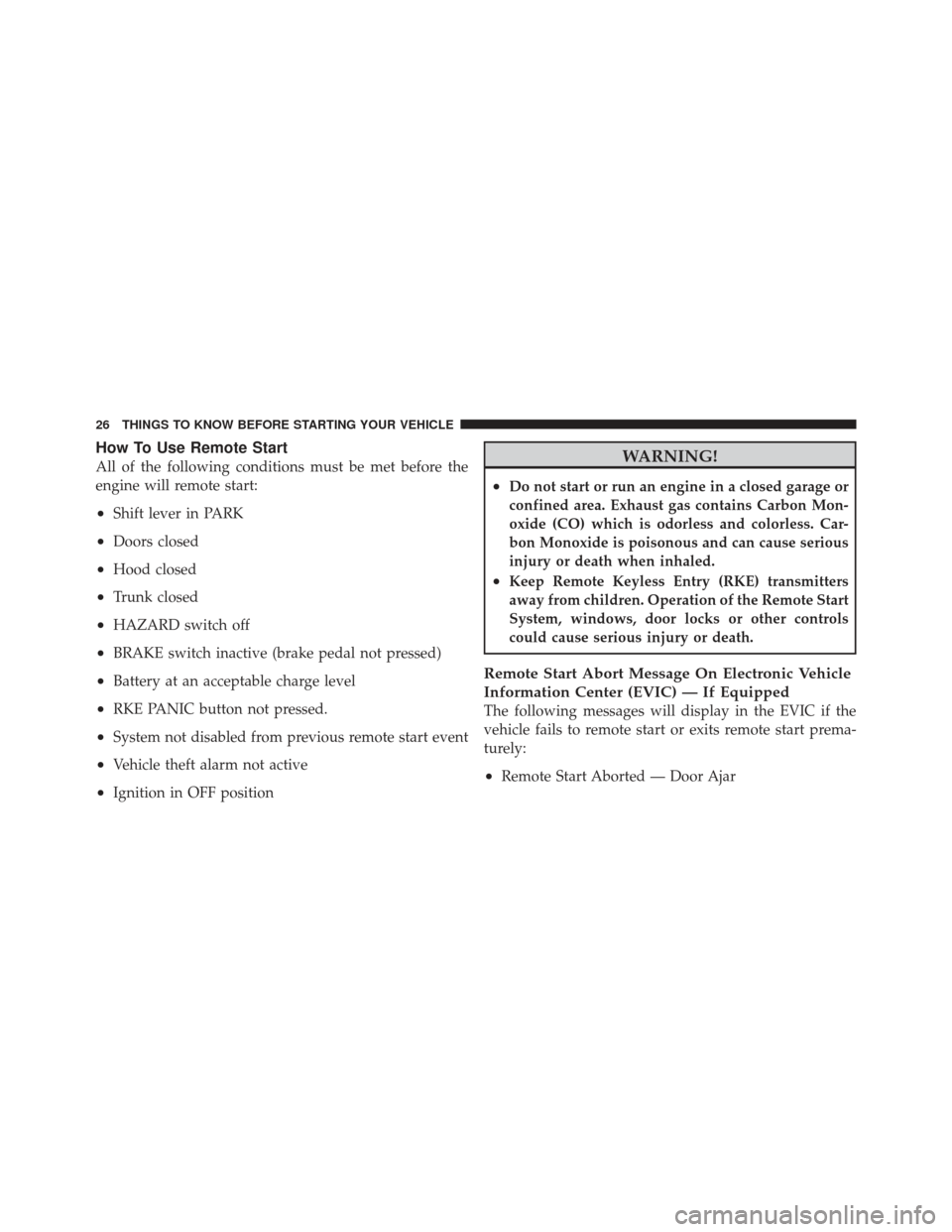Page 2 of 594

VEHICLES SOLD IN CANADAWith respect to any Vehicles Sold in Canada, the name
Chrysler Group LLC shall be deemed to be deleted and the
name Chrysler Canada Inc. used in substitution therefore.DRIVING AND ALCOHOLDrunken driving is one of the most frequent causes of
accidents.
Your driving ability can be seriously impaired with blood
alcohol levels far below the legal minimum. If you are
drinking, don’t drive. Ride with a designated non-drinking
driver, call a cab, a friend, or use public transportation.
WARNING!
Driving after drinking can lead to an accident. Your
perceptions are less sharp, your reflexes are slower,
and your judgment is impaired when you have been
drinking. Never drink and then drive.
This manual illustrates and describes the operation of
features and equipment that are either standard or optional
on this vehicle. This manual may also include a description
of features and equipment that are no longer available or
were not ordered on this vehicle. Please disregard any
features and equipment described in this manual that are
not on this vehicle.
Chrysler Group LLC reserves the right to make changes in
design and specifications, and/or make additions to or
improvements to its products without imposing any obliga-
tion upon itself to install them on products previously
manufactured.
Copyright © 2011 Chrysler Group LLC
Page 5 of 594
INTRODUCTION
CONTENTS
�Introduction ........................... 4
� How To Use This Manual .................. 4
� Warnings And Cautions ................... 6 �
Vehicle Identification Number .............. 6
� Vehicle Modifications/Alterations ............ 7
1
Page 8 of 594
WARNINGS AND CAUTIONS
This Owner’s Manual containsWARNINGSagainst op-
erating procedures that could result in a collision or
bodily injury. It also contains CAUTIONSagainst proce-
dures that could result in damage to your vehicle. If you
do not read this entire manual, you may miss important
information. Observe all Warnings and Cautions.
VEHICLE IDENTIFICATION NUMBER
The Vehicle Identification Number (VIN) is on the left
front corner of the instrument panel. The VIN is visible
from outside of the vehicle through the windshield. This
number also appears on the Automobile Information
Disclosure Label affixed to a window on your vehicle, the
vehicle registration, and the title. The vehicle identification number (VIN) is also located
on the right front strut tower inside the engine compart-
ment.
VIN Location
6 INTRODUCTION
Page 9 of 594
NOTE:It is illegal to remove or alter the VIN.
VEHICLE MODIFICATIONS/ALTERATIONS
WARNING!
Any modifications or alterations to this vehicle could
seriously affect its roadworthiness and safety and
may lead to an accident resulting in serious injury or
death.
1
INTRODUCTION 7
Page 12 of 594

▫Using The Panic Alarm ................. 23
▫ Programming Additional Transmitters ...... 23
▫ Transmitter Battery Replacement .......... 24
▫ General Information ................... 25
� Remote Starting System — If Equipped ....... 25
▫ How To Use Remote Start ............... 26
� Door Locks ........................... 28
▫ Manual Door Locks ................... 28
▫ Power Door Locks .................... 29
▫ Child-Protection Door Lock System — Rear
Doors ............................. 31
� Keyless Enter-N-Go ..................... 32 �
Windows ............................ 36
▫ Power Windows ...................... 36
▫ Wind Buffeting ....................... 39
� Trunk Lock And Release ................. 39
� Trunk Safety Warning ................... 40
▫ Trunk Emergency Release ............... 41
� Occupant Restraints ..................... 41
▫ Lap/Shoulder Belts .................... 43
▫ Lap/Shoulder Belt Untwisting Procedure .... 49
▫ Seat Belts In Passenger Seating Positions ..... 49
▫ Automatic Locking Retractor Mode (ALR) —
If Equipped ......................... 50
▫ Energy Management Feature ............. 51
10 THINGS TO KNOW BEFORE STARTING YOUR VEHICLE
Page 17 of 594

WARNING!
•When leaving the vehicle, always remove the key
fob from the ignition and lock your vehicle.
•Never leave children alone in a vehicle, or with
access to an unlocked vehicle.
•Allowing children to be in a vehicle unattended is
dangerous for a number of reasons. A child or
others could be seriously or fatally injured. Chil-
dren should be warned not to touch the parking
brake, brake pedal or the shift lever.
•Do not leave the key fob in or near the vehicle, and
do not leave a vehicle equipped with Keyless
Enter-N-Go in the ACC or ON/RUN mode. A child
could operate power windows, other controls, or
move the vehicle.
•Do not leave children or animals inside parked
vehicles in hot weather. Interior heat build-up may
cause serious injury or death.
CAUTION!
An unlocked car is an invitation to thieves. Always
remove the Key Fob from vehicle, cycle the ignition
OFF and lock all doors when leaving the vehicle
unattended.
SENTRY KEY�
The Sentry Key�Immobilizer system prevents unauthor-
ized vehicle operation by disabling the engine. The
system does not need to be armed or activated. Operation
is automatic, regardless of whether the vehicle is locked
or unlocked.
The system uses a Key Fob with Remote Keyless Entry
(RKE) transmitter, a Keyless Ignition Node (KIN) and a
RF receiver to prevent unauthorized vehicle operation.
Therefore, only Key Fobs that are programmed to the
vehicle can be used to start and operate the vehicle.
2
THINGS TO KNOW BEFORE STARTING YOUR VEHICLE 15
Page 28 of 594

How To Use Remote Start
All of the following conditions must be met before the
engine will remote start:
•Shift lever in PARK
•Doors closed
•Hood closed
•Trunk closed
•HAZARD switch off
•BRAKE switch inactive (brake pedal not pressed)
•Battery at an acceptable charge level
•RKE PANIC button not pressed.
•System not disabled from previous remote start event
•Vehicle theft alarm not active
•Ignition in OFF position
WARNING!
•Do not start or run an engine in a closed garage or
confined area. Exhaust gas contains Carbon Mon-
oxide (CO) which is odorless and colorless. Car-
bon Monoxide is poisonous and can cause serious
injury or death when inhaled.
•Keep Remote Keyless Entry (RKE) transmitters
away from children. Operation of the Remote Start
System, windows, door locks or other controls
could cause serious injury or death.
Remote Start Abort Message On Electronic Vehicle
Information Center (EVIC) — If Equipped
The following messages will display in the EVIC if the
vehicle fails to remote start or exits remote start prema-
turely:
•Remote Start Aborted — Door Ajar
26 THINGS TO KNOW BEFORE STARTING YOUR VEHICLE
Page 31 of 594
WARNING!
•For personal security and safety in the event of an
accident, lock the vehicle doors before you drive as
well as when you park and leave the vehicle.
•When leaving the vehicle, always remove the key
fob from the ignition and lock your vehicle.
•Never leave children alone in a vehicle, or with
access to an unlocked vehicle.
•Allowing children to be in a vehicle unattended is
dangerous for a number of reasons. A child or
others could be seriously or fatally injured. Chil-
dren should be warned not to touch the parking
brake, brake pedal or the shift lever.
•Do not leave the key fob in or near the vehicle, and
do not leave a vehicle equipped with Keyless
Enter-N-Go in the ACC or ON/RUN mode. A child
could operate power windows, other controls, or
move the vehicle.
Power Door Locks
A power door lock switch is on each front door trim
panel. Use this switch to lock or unlock the doors.
Power Door Lock Switch
2
THINGS TO KNOW BEFORE STARTING YOUR VEHICLE 29